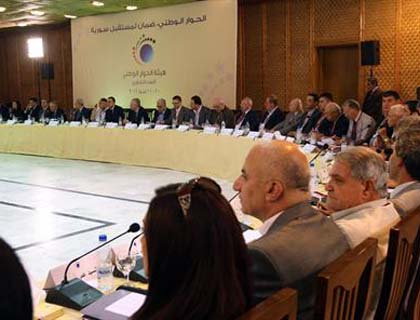Months-long civil uprising and its growing perversion into a full-fledge armed opposition to Bashar al-Assad regime has set Syria at the center of global focus. Just putting a glimpse to domestic and global newspapers, reports about the Syrian civil uprising, growing violence and the analyses of future of the country have remained a central issue since the start of the so-called Arab Spring.
Countries where people finally succeeded to topple their authoritarian regime alone or by the help of foreign countries now are busy to set their revolutions on the right track. Egypt held presidential election late last month in which Muslim Brotherhood nominee, Mr. Mohmmad Morsi, defeated his rival, Mr. Ahmad Shafiq. Now he is struggling deeply to gain the trust of the society and people that would not lead the country towards radicalism instead establish a fair democratic structure where the people may find the opportunity to have their own share.
Same is the case with Libyans where Moummar Gaddafi, unlike his Egyptian counterpart, Mr. Hosni Mobarak, never held elections. On Saturday, July 07, the country held the first historic parliamentary election after 50 years. However, clashes were reported before the commencement of election, but the election was not postponed for the second time and Libyans participated to elect 200 representatives from among 3000 candidates.
While in the rest of Arab world, continuous uprising and violence finally decreased and demonstrators failed to achieve their goals as in the case of Bahrain and Yemen. In several other Arab countries, initially some people tried to hold similar demonstrations but people generally remained calm as regimes promised changes in the political establishment.
However, the case completely differs in Syria. On one hand, the Damascus regime showed no flexibility against protestors and labeled as elements of terrorism and al-Qaeda, on the other hand, protestors could gain the attention of international community to mount pressure on Damascus. They also moved from mere demanding for economic and political reforms to complete opposition to regime and its elimination.
Now many maintain that they can reach to democracy only through armed struggle which unfortunately till now proved deadly. Just on Saturday, 16 people—nine civilians, five soldiers and two rebels—were killed across the country.
Regime forces bombarded a string of towns in Aleppo province, aimed to regain control over this region, where they have suffered heavy casualties over the past months," the Syrian Observatory for Human Rights said. "A large number of families have been displaced from the area for fear of shelling and lack of water, electricity and medical services".
According to reports, The Syrian General Revolutionary Authority said that shelling intensified through the night in the Old Homs neighborhood and Hamidiyeh, where "many people were buried under the rubble" of a collapsed building.
Meanwhile, oppositions have organized their power and now able to deal severe blow to security forces headquarters. During recent months, the Syrian forces' casualties have increased tremendously. Every now and then, soldiers are killed as result of rebellions shootings which denote on growing power of rebellions.
The situation has become gruesomely dangerous when the international community failed to take a joint front against Damascus. Drafts prepared mostly by European countries for tougher action were vetoed twice in the United Nations Security Council by China and Russia which feared about the consequences.
So, in order not to undergo similar situation of Libya, Chinese and Russian officials dealt with Syrian regime with much more caution. They refused to approve drafts which indirectly paved the way for military intervention.
Moreover, the Libyan mission was not carried completely with visible victory. It continued for months and imposed cost on the already economic-slowdown stroke military budget. So, it is clear that comparing Libya with Syria is a blunt mistake because the regime of President Assad is far powerful and also interconnected with countries like Iran and groups like Hezbollah. Thus, considering the challenges, it is far likely for anti-Assad countries to start a war against Damascus.
In other words, the United States is engaged in a corrosive war against Taliban-led militants in Afghanistan and just pulled out of Iraq; clearly, it does not have the will to start another war in such crisis ridden region. Without the US, it is far likely that its European allies embark to such financially and humanitarianly costly war.
The regional rivalry among countries is also something that cannot be neglected assessing the ongoing situation in Syria.
Tehran has been supporting President Assad since the very start of civil uprising. The supreme leader who is the ultimate decision maker in the country, Mr. Ayatollah Ali Khamenae often openly voiced out support for Damascus regime while condemning other regimes reacted similarly in the case of uprising breakout. While insisting that Arab countries are affected by more than 30-years old Islamic revolution in Iran, he links civil unrest in Syria to foreign intervention.
Therefore, the so-called proxy war and the dominant presence of Allawites, a minority that can hardly be branded as part of Shiite group, have further complicated the situation. According to the United Nations reports, more than 9000 people are killed since the start of uprising more than a year ago, and more than thousands of people killed in period after ceasefire accord mediated by joint Arab-UNs representative, Mr. Kofi Annan on April this year. The ceasefire has not helped least to peace and instability. With the presence of Arab monitoring mission, available reports denote on severe clashes between minor armed opposition and security forces.
Seemingly, all stakeholders are tittering up and down to find a solution to the deadlock but there is nothing to count on much. But this is Syrian people who ultimately shoulder all the burdens of continuous instability and unrest. There are talks about ending war by UN peace keeping forces mission as both sides do not come short and there were reports about targeting peace keepers. The prospective is terribly dark.

